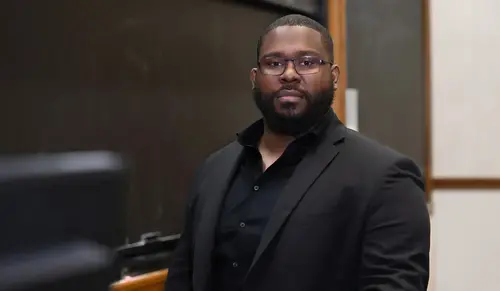The American Institute of Physics (AIP) and the National Society of Black Physicists (NSBP) have named Yale physicist Charles D. Brown II as the winner of the Joseph A. Johnson Award for Excellence.
Brown is an assistant professor of physics in Yale’s Faculty of Arts and Sciences. He earned his Ph.D. at Yale in 2019, co-founded the Yale League of Black Scientists, and was one of the lead organizers of #BlackInPhysics week.
The Johnson Award honors an early career physicist who exemplifies the scientific ingenuity and passion for mentorship and service of Joseph A. Johnson III ’61 M.S., ’65 Ph.D., the renowned experimental physicist and NSBP founder who was a mentor to many Black doctoral students. The honor comes with a $5,000 award.
“I’m deeply honored to receive the J.A. Johnson III award, especially given our shared experience as Yale physics Ph.D. graduates,” Brown said. “Professor Johnson was an academic leader who was impactful in scientific research on turbulent plasmas, in the lives of students he mentored, and through the organizations that he was instrumental in founding.
“I’m moved by the idea that I am carrying on the legacy of a historically important physicist like Professor Johnson.”
Brown conducts research at the interface of atomic, molecular, and optical physics (AMO) and condensed matter physics. He uses experimental atomic physics techniques to create synthetic crystals which consist of extremely cold atoms hopping around grids made of light.
These atoms share many similarities with the electrons that hop around the grid of those atoms that make up solids — a relationship that enables Brown to perform quantum simulation experiments with potentially useful new materials.
“These model systems are poised to teach us about so much physics, including exotic phases of mater and quantum field theories,” he said. “They may even be useful for shedding light on physics beyond the standard model.”
Brown added, “I am called to mentor because I’m a scholar that believes the global university system is among the most important creations of our species,” Brown said. “As a scholar, I aim to produce new knowledge through research and to teach and mentor my peers and younger scientists, so that we may have a thriving academic system that continues to produce knowledge and broadly uplift our diverse society for long into the future.
“Achieving this goal necessitates mentoring and working to increase access so science is done not by a select few, but by a group that reflects society.”
